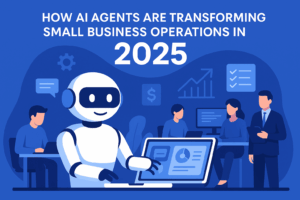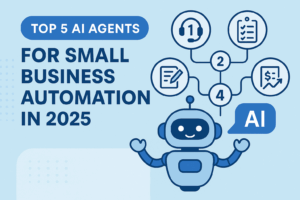The AI automation landscape has shifted dramatically in 2025. What once required extensive custom development and complex integrations can now be implemented by any business owner with a weekend and a willingness to learn. We’re past the experimental phase—these AI tools for small business are delivering measurable ROI right now, helping owners reclaim 10-15 hours per week while reducing operational costs by 20-30%.
The difference isn’t just technological; it’s practical. Today’s automation tools for entrepreneurs are designed for real businesses with real constraints: limited budgets, small teams, and owners who need solutions that work immediately, not eventually.
Here are five tools we consistently recommend to clients looking to automate small business tasks without the complexity or cost overruns that derailed earlier AI adoption attempts.
1. ChatGPT + Custom GPTs: Your All-in-One Business Assistant
What it is: OpenAI’s ChatGPT platform now includes Custom GPTs—specialized AI assistants you can train for specific business functions without any coding.
Business problem it solves: Content creation, customer service responses, and repetitive knowledge work that currently consumes hours of your team’s time.
Realistic use cases:
- Service businesses: Create a custom GPT trained on your service offerings and FAQ responses to handle initial customer inquiries
- E-commerce: Generate product descriptions, email sequences, and social media content at scale
- Professional services: Draft proposals, contracts, and client communications using your firm’s specific language and templates
Why it’s essential in 2025: Custom GPTs eliminate the “blank page” problem that made ChatGPT frustrating for many business owners. Instead of crafting perfect prompts every time, you build an assistant that already knows your business context. Our clients typically see 60% faster content creation and 40% more consistent customer communication within the first month.
2. Zapier Central: No-Code Automation That Actually Works
What it is: An AI-powered automation platform that connects your existing software tools and handles multi-step workflows through natural language commands.
Business problem it solves: The tedious data entry, follow-up tasks, and handoffs between different software systems that plague growing businesses.
Realistic use cases:
- Lead management: Automatically move leads from your website form to CRM, send welcome emails, and schedule follow-up tasks
- Customer onboarding: Create new client folders in project management tools, send welcome packets, and trigger team notifications
- Financial workflows: Extract data from invoices, update accounting software, and send payment reminders
Why it’s worth adopting now: Zapier Central’s AI component means you can describe workflows in plain English rather than mapping out complex trigger-action sequences. This small business automation approach cuts implementation time from weeks to hours, making it accessible for business owners who don’t have dedicated IT support.
3. Perplexity AI Pro: Research and Analysis at Scale
What it is: An AI research assistant that provides sourced, up-to-date information and analysis, going beyond simple web searches to deliver actionable insights.
Business problem it solves: The time-consuming research required for market analysis, competitive intelligence, and staying current with industry trends.
Realistic use cases:
- Market research: Analyze competitor pricing, identify emerging trends in your industry, and validate new business ideas
- Content strategy: Research trending topics, gather supporting data for blog posts, and identify content gaps in your market
- Vendor selection: Compare software solutions, analyze customer reviews, and create evaluation criteria for business tools
Why it’s critical for 2025: Information moves faster than ever, and small businesses can’t afford dedicated research staff. Perplexity Pro delivers enterprise-level market intelligence at a fraction of the cost, helping you make informed decisions that previously required significant time investment or additional resources.
4. Typeform AI: Intelligent Data Collection and Lead Qualification
What it is: An enhanced form builder that uses AI to create dynamic, conversational surveys and lead capture forms that adapt based on user responses.
Business problem it solves: Poor lead qualification and low engagement rates from static forms that fail to capture quality information from potential customers.
Realistic use cases:
- Service businesses: Create intelligent intake forms that ask follow-up questions based on initial responses, ensuring you get complete project requirements upfront
- Consultancies: Build assessment forms that provide immediate value to prospects while gathering qualification data
- E-commerce: Design product recommendation quizzes that guide customers to the right solutions while capturing email addresses
Why it’s valuable this year: AI-powered forms convert 2-3x better than static alternatives because they feel like conversations rather than interrogations. For AI software for midsized businesses looking to improve lead quality, this tool pays for itself through better customer matching and reduced time spent on unqualified prospects.
5. Tango AI: Process Documentation and Training Automation
What it is: An AI-powered tool that automatically creates step-by-step process documentation and training materials by watching you complete tasks on your computer.
Business problem it solves: The knowledge bottlenecks that occur when key processes exist only in employees’ heads, making delegation and scaling difficult.
Realistic use cases:
- Standard operating procedures: Document your customer onboarding process, quality control checklists, and vendor management workflows
- Employee training: Create visual guides for software tools, administrative processes, and customer service protocols
- Knowledge preservation: Capture institutional knowledge before key employees leave or transition to new roles
Why it’s transformative for growing businesses: Most small businesses lose 20-30% productivity during employee transitions because processes aren’t properly documented. Tango AI eliminates this friction by making process documentation effortless—you simply perform the task once, and it creates comprehensive training materials automatically.
Ready to Transform Your Business Operations?
These best AI tools 2025 represent proven solutions that deliver immediate value without requiring technical expertise or massive upfront investments. The businesses implementing these tools now are building sustainable competitive advantages while their competitors debate whether AI is ready for prime time.
The question isn’t whether to adopt AI automation—it’s which tools to implement first and how to maximize their impact on your specific business challenges.
Need help choosing the right AI tools for your business? At Upline, we specialize in helping small and midsized businesses identify, implement, and optimize AI automation solutions that deliver measurable results. Contact us for a consultation where we’ll assess your current processes and recommend a custom automation roadmap that fits your budget and timeline.



